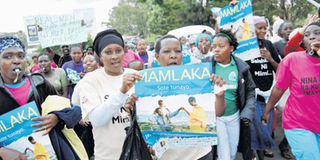Media should play leading role in the war on gender-based violence

Activists march in Kibera slums, Nairobi, last week, to mark the start of 16 days of activism against gender-based violence. FILE PHOTO
Kenya, along with the global community, is marking 16 days of activism against gender-based violence, which has been on the UN calendar since November 25, 1999.
The November 25 launch date — the International Day for the Elimination of Violence against Women — rolled off a series of human rights observances, including International Women Human Rights Defenders Day, November 29, which appears to have passed unnoticed on Friday.
Not so for World Aids Day, which had a high-profile launch at the Mbaraki Sports Ground in Mombasa at the weekend. Ms Jennifer Wambua of the National Aids Control Council told the Nation that the council’s activities to mark the day included a visit to the Coast Provincial Hospital’s paediatric and maternity wards, and the Tumaini Children’s Home with 59, of whom 31 are HIV-positive.
Tomorrow, December 3, is the International Day for the Disabled, followed on December 6 by the commemoration of the Montreal Massacre in which 14 female engineering students were gunned down by a man because they were feminists.
The days of activism against gender-based violence (GBV) will end on December 10 — the International Human Rights Day.
At an editors’ function last Thursday, the two main speakers — Africa Women and Child Feature Service executive director Arthur Okwemba and the International Rescue Committee’s Peace and Media coordinator John Ndeta — revisited the truth that women bear the brunt of gender-based violence.
Quoting from a 2008 study by the Federation of Women Lawyers — Kenya (Fida), Mr Ndeta noted that 80 per cent of perpetrators of gender-based violence are men, as opposed to women who account for 14 per cent. Parents and custodians account for five per cent of the offenders.
Gender-based violence, Mr Okwemba says, has physical, emotional, sexual and economic dimensions and is mostly directed at vulnerable groups, with intimate partners and relatives among the perpetrators.
Workplace and social places as well as learning institutions are other places where gender-based violence occurs.
Forms of gender-based violence include defilement (sexual abuse of a minor); sexual and physical violence; forced and early marriages; female genital cutting; rape; wife or partner battering; forced pregnancies and abortions as well as assault.
The presenters noted that violence is blind to social status, with media women, women lawmakers, those in the disciplined forces and their Judiciary counterparts being subjected to it. One of the most horrendous cases of GBV was the 1983 gouging out of the eyes of schoolteacher Piah Njoki, whose husband was aggrieved that the mother of five had not given him any son.
Happening only two years before the UN Decade for Women Conference in Nairobi, the issue did not only become the focus of attention at the meeting, but also established Fida as a defender of women’s rights as it pursued justice for Piah. The teacher had to learn braille to maintain her career.
VICTIM OF BATTERY
Of even more recent memory is the battery of police officer Betty Kavata, who died at Christmas in 1998, aged only 27 years, leaving behind an eight-year-old daughter. The officer was in agony at the Kenyatta National Hospital for months — a victim of battery from her husband earlier that year. She was paralysed from neck down, unable to speak and only emitting unintelligible heart-wrenching noises.
With almost all her teeth knocked out and hair uprooted by her husband — fellow police officer Felix Nthiwa — one wonders what her sin was. She did not serve him meat for dinner, it was reported.
A 2012 survey on battering, rape and lethal violence found that women in Nairobi are most at risk of attack from current/intimate partners.
The cost of violence includes missed work hours, treatment of injuries and sexually transmitted infections, especially in cases of rape, and miscarriages.
A major psycho-social cost is raising children, who because of exposure to violence, have been found to be more prone to becoming violent parents in future.
Paradoxically, GBV in Kenya occurs in spite of legislative and policy safeguards in place that include the Constitution, the Sexual Offences Act 2006, the Social Protection Policy, and the 2011 Prohibition of FGM Act.
Media are challenged to play their part in ending GBV.
“It is not enough to focus on putting in place legislation — it is time to reform institutional structures that transform the GBV ideology, response and interventions. It is time to invest in re-educating society towards a new ideology that recognises the worth of girls and women and the equality of the sexes. The media should take a lead role to inform society on this,” Mr Ndeta says.





